Graham Reid | | 6 min read
Joe Bonamassa: Athens to Athens (live)
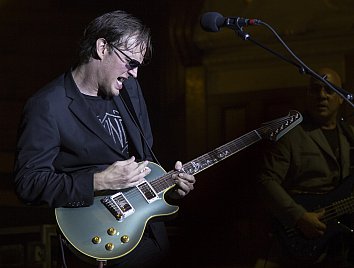
If it was a bluff, it was convincing one.
The problem was her saxophonist, a guy with a ponytail whose solo spots were cynically constructed to be crowd-pleasing but were emotionally empty.
You know the kind of sax solo: start off low'n'slow and then pick up the pace and finish on a piercingly high note that has the punters baying like rabid dogs.
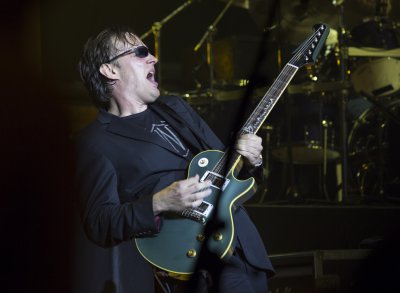 He was just so . .
. obvious, and I find that kind of gesture quite cynically manipulative.
He was just so . .
. obvious, and I find that kind of gesture quite cynically manipulative.
In fact I wrote a review of a New Zealand jazz bassist and called him a cynical player because I'd seen him many times pull out a solo which pushed all the right buttons for the audience and when they applauded his efforts – such as they were, he was much better than that – he would sometimes turn to the band and smirk with condescending amusement. The people had fallen for it again.
There are limitations on live musicians of course, especially when it comes to solo space in a stadium show and Turner's saxman was probably under the constraints of the lighting set-up as much as anything.
But some artists have more space to deliver something special on the night.
Many years ago I interviewed the great Irish musicians Christy Moore in Wellington before a show and he told me he could never repeat a set because it would drive him insane to be just going through the motions. I believed him (because I admired his work and he seemed utterly sincere) but a week later I saw him in Auckland and . . .
Right down the pauses and word-for-word spoken introductions.
Some musical idioms led themselves to crowd-pleasing cliché.
There has long been the affliction of reggae in this country (a musical style I love in its most authentic and innovative forms) and all a band need do is hit that familiar groove to guarantee an audience up on its feet.
That has become prevalent at Womad festivals too now where bands – whether they be from Malawi or Malaga – have their crowd-pleasing reggae groove, albeit with slight twists to accommodate their local idiom.
And the blues of course – a music built on preceding generations and artists – has a series of familiar tropes which players can fall back on, whether it be head-down boogie, slow and pain-filled guitar solos, familiar old songs (usually made over like Led Zeppelin) or whatever.
And increasingly I have come to believe that many people in audiences do not want the shock of the new, they want the frisson of the familiar.
Hit the right chords which people recognise and they will be happy.
You could be cynical about that.
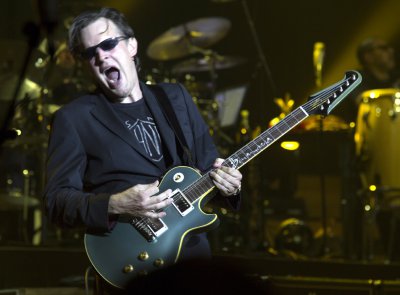 Joe Bonamassa is a
technically gifted player grounded in the blues and you would never
deny he not only knows his stuff but knows it intimately. He has
played with all his heroes.
Joe Bonamassa is a
technically gifted player grounded in the blues and you would never
deny he not only knows his stuff but knows it intimately. He has
played with all his heroes.
But over a vast catalogue of albums he has, to my ears, rarely written any songs of striking invention. His most recent outing Different Shades of Blue – released on the day of this Auckland concert – was his first album of all self-penned (or co-written) songs and while it is impressive on many levels you wouldn't accuse him of originality.
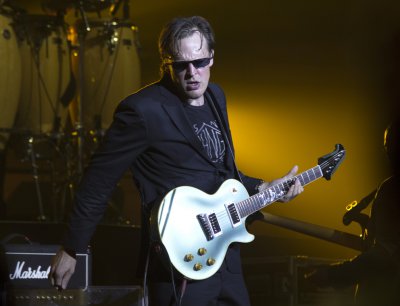 But he certainly
knows what to play . . . and the second half of this concert when he
strapped on electric guitars confirmed that.
But he certainly
knows what to play . . . and the second half of this concert when he
strapped on electric guitars confirmed that.
It was crowd-pleasing, it touched on and referred to many familiar blues tropes, and it was hugely well received by a capacity audience. Although to my eyes it seemed that big crowd were thrilled more by the opening acoustic set which was genuinely exploratory.
People cheered and applauded at the end of songs in the electric set, but it was noticeable many simply stood and watched during proceedings, whereas in the acoustic set there was a palpable feeling a real engagement.
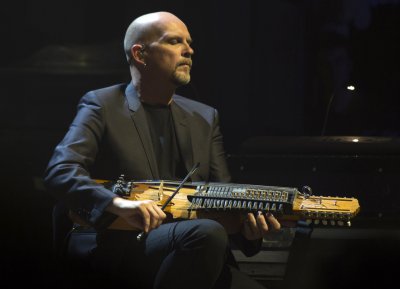 In that first half
Bonamassa with his small band deployed some impressively broad
instrumentation, among them Swedish nyckelharpa (a fiddle with
fretboards and keys if you will, played by Mats Wester, right) alongside Irish bodhran (drum),
fiddle, banjo and keyboards.
In that first half
Bonamassa with his small band deployed some impressively broad
instrumentation, among them Swedish nyckelharpa (a fiddle with
fretboards and keys if you will, played by Mats Wester, right) alongside Irish bodhran (drum),
fiddle, banjo and keyboards.
And the songs – among them the yearning Seagull and the exceptional Athens to Athens which was giving a persuasively vigorous treatment – really benefitted from this folk blues-cum-world music approach.
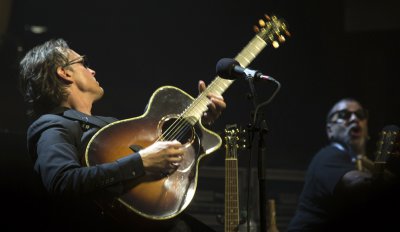 Bonamassa is not
alone in exploring the blues in this way. Robert Plant's most recent
outings with the Sensational Space Sifters being an obvious reference
point, but also Bonamassa's peers like Derek Trucks who incorporates
Indian microtones in his laying. Or slide guitarist Doug Cox who has
played with Indian musicians, the late Bob Brozman who explored the global connections and Harry Manx who is coming to
Auckland soon.
Bonamassa is not
alone in exploring the blues in this way. Robert Plant's most recent
outings with the Sensational Space Sifters being an obvious reference
point, but also Bonamassa's peers like Derek Trucks who incorporates
Indian microtones in his laying. Or slide guitarist Doug Cox who has
played with Indian musicians, the late Bob Brozman who explored the global connections and Harry Manx who is coming to
Auckland soon.
This is profitable blues-plus territory and Bonamassa was thoroughly engaged – and from discussions I had at interval and afterwards this really surprised his audience who seemed to largely know him for his powerful electric blues.
Black Lung Heartache came with references to Indian drones and fiddle, Tom Waits' Jockey Full of Bourbon jaunted down to New Orleans courtesy of keyboards by Derek Sherinian (of Black Country Communion).
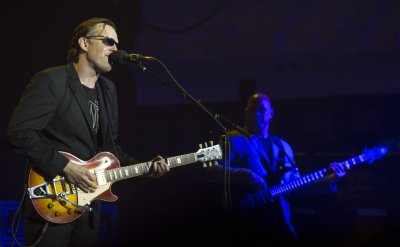 As with so many
blues artists, Bonamassa's vocals are rather undistinguished (and
audibly weak on Happier Times) but your attention was always on this
swirling sonic settings.
As with so many
blues artists, Bonamassa's vocals are rather undistinguished (and
audibly weak on Happier Times) but your attention was always on this
swirling sonic settings.
It really was something else.
But the electric set – undeniably impressive on many levels, just as Turner's saxophonist was – delivered little more than technically adept but increasingly referential and familiar blues tropes.
Yes, it was crowd-pleasing, but my thinking was we were enjoying that same old thing: the frisson of the familiar.
He effectively conjured up the spirits of the past – you could tick off Elmore James, B.B. and Albert King, Led Zeppelin, Jimi Hendrix and others in songs that were sometimes little more than vehicles for the guitar -- and I got the clear impression Bonamassa had travelled through this set many times before.
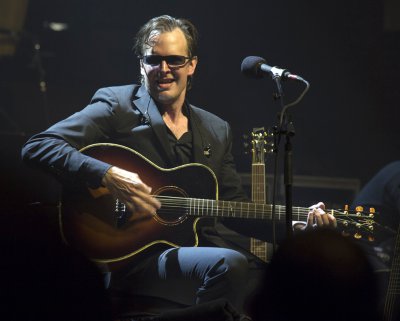 Maybe he had also
done that acoustic set as often (think Christy Moore) but it sounded
fresher and he seemed more engrossed by it and enjoying it more.
Maybe he had also
done that acoustic set as often (think Christy Moore) but it sounded
fresher and he seemed more engrossed by it and enjoying it more.
The electric half traveled old roads in new clothes.
Now, that is in the nature of the blues of course.
It is, like jazz, a music standing on the shoulders of the ancestors and masters.
But – despite the bruising Sabbath-like riffery (Ballad of John Henry) and moments of soulful beauty (Sloe Gin) – I had the very distinct feeling buttons were being pushed . . .
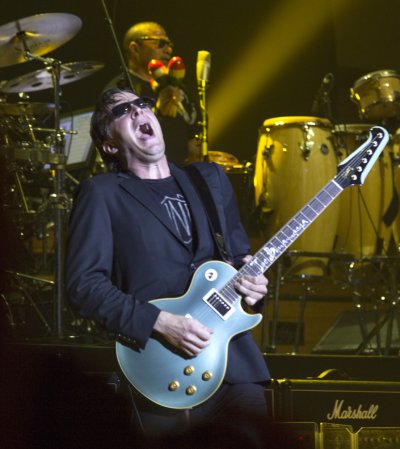 And the solos would built to
their obvious conclusion, on a piercingly high note that would have
the punters baying like rabid dogs.
And the solos would built to
their obvious conclusion, on a piercingly high note that would have
the punters baying like rabid dogs.
"And so that happened", as Eddie Izzard says.
Bonamassa has had a highly productive career, but these days the blues – because of its history and the loyalty of the audience – allows for that in a way that previous generations could not enjoy.
Whether Joe Bonamassa is to be counted among the greats or as just a gifted journeyman remains to be seen.
He isn't the first and nor will he be the last to find a place for himself in the blues.
I didn't say it but a friend did: Jeff Healey.
Images here by Garry Brandon who has been a concert and commercial photographer for decades in New Zealand. All images copyright Garry Brandon, whose website of archival concert and other work is here. There is more of Garry's work at Elsewhere with these reviews here.
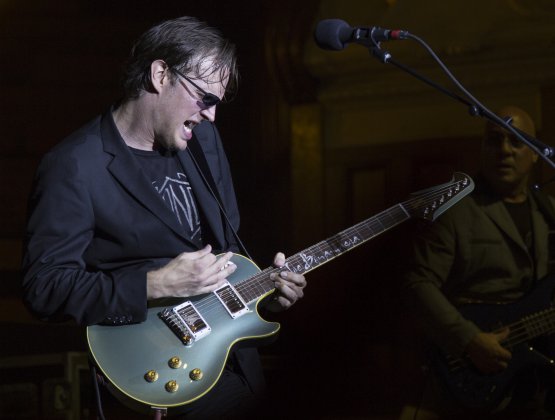
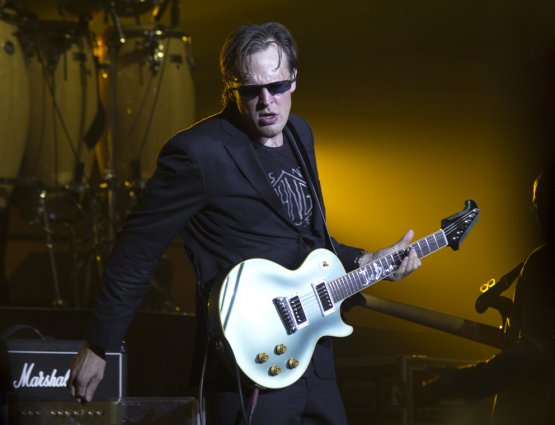

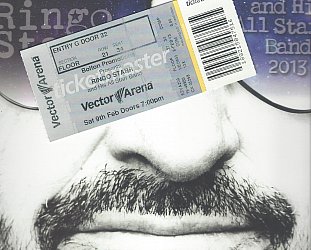
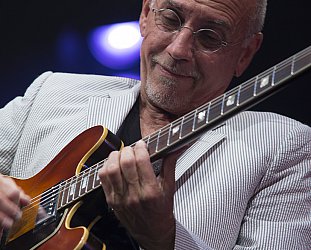

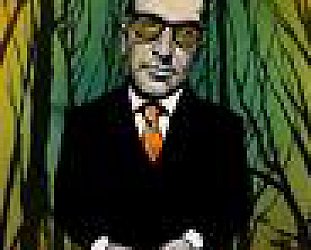
Brian - Sep 14, 2014
Very insightful and perceptive article Graham ( quite lengthy compared to your usual). I didn't go to the gig. I know that Bonamassa is regarded in some circles as a master. I am not disputing that I am not qualified to do so. Your comments on Womad were bang on. I have been to many ( in NZ and O/S ) and find ( particularly in NZ ) that we are getting more and more of this crossover popular reggae influenced stuff and it puts me off going. It is not " World Music " by any margin - if you have been lucky enough to see say Tinariwen or Toumani Diabate or Faiz Ali Faiz you will know what I mean. This is real World music unadulterated by the ever increasing dross we get foisted on us these days.
SaveI love music with a passion but one thing that really irks me at live gigs are solos - doesn't matter what, sax, guitar, drums ( drum solos in particular really piss me off ) it almost makes me up and leave. However when you get musicians who compliment each other with consideration, respect and high ability playing without the need for solo, in my opinion that is when you are seeing something real - you don't need showmanship to highlight ability and I find it just detracts from the sum of the parts.
Bring on Harry Manx and the Americana fest - I hope you are going and we can have a beer and a grizzle. Cheers as always.
post a comment